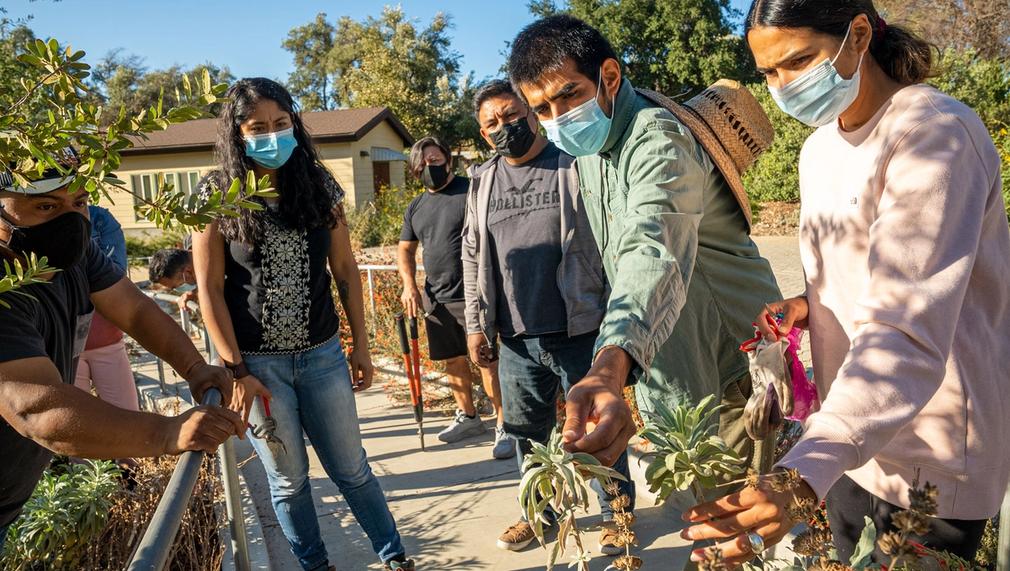Climate-Ready Native Plant Landscaper Training
Our California Native Plant Landscaper Certificate Program is a bilingual (English and Spanish) job-training program for working and aspiring landscape professionals developed and taught by California’s leading native plant experts. This training provides landscapers with career advancement skills, grows independent businesses, and supports climate-resilient communities through water and energy conservation, wildfire defense, and wildlife habitat creation, while bringing the unique beauty of LA’s local ecology into our communities and homes.

What is the primary issue area that your application will impact?
Green space, park access, and trees
In what stage of innovation is this project, program, or initiative?
Expand existing project, program, or initiative (expanding and continuing ongoing, successful work)
What is your understanding of the issue that you are seeking to address?
Climate change increasingly affects LA residents with rising temperatures, prolonged droughts, and heightened wildfire risks. Our region needs more greenspaces not only to benefit residents' physical and mental well-being, but also for carbon sequestration, heat-island mitigation, wildfire defense, and natural resource conservation. Having adapted to our local climate over thousands of years, California native plants are drought-tolerant and wildfire-resilient, making them uniquely suited to the climate challenges LA County residents are facing. The need for a landscaper workforce that is familiar with native plant care is greater than ever, yet many professionals in the industry do not possess the specialized knowledge to plant and maintain California native plants. Our 10-part curriculum addresses key components of sustainability and gives landscape practitioners the skills and information they need to create and maintain beautiful climate-resilient landscapes across LA successfully.
Describe the project, program, or initiative this grant will support to address the issue.
Developed in partnership with the California Native Plant Society (CNPS) and launched in the summer of 2020, TPF's California Native Plant Landscaper Certification (CNPLC) program is a survey course designed to train current and aspiring landscaping professionals on best management practices for native based gardens. Students gain insights into plant ID, site evaluation, garden design, irrigation management, planting, maintenance, and wildfire-resilience practices. The course includes a combination of theory-based lectures and hands-on learning. Graduates develop increased confidence in their ability to manage natives and a deeper understanding of how native plant landscaping promotes climate-resilient greenspaces within our built environment and conserves resources. In an industry that historically undervalues manual labor and has ethnic- and gender-based disparities in pay and positions, this certification provides in-demand skills and career advancement opportunities for landscapers.
The program has grown steadily over the last four years, supported by generous grant funding from the Los Angeles Department of Water and Power (LADWP) Community Partnerships program, the US Green Building Council (USGBC), and LA2050. Since the initial pilot cohort, the program has certified over 1,000 landscape professionals at all stages of their careers, as business owners or members of landscaping crews, working in private and public landscapes across Los Angeles County and beyond.
Describe how Los Angeles County will be different if your work is successful.
By ensuring a steady influx of knowledgeable landscapers skilled in the use of California native plants, this program will ensure that the benefits of native plant landscaping are not just theoretical but widely realized, fostering community resilience and contributing to a healthier, more sustainable environment for all residents. Creating more climate-resilient, native plant landscapes in the urban environment will reduce the consumption of non-renewable natural resources, promote wildfire resilience, reduce chemical pest control, and support biodiversity. Simultaneously, we can empower landscape workers with enhanced skills and opportunities to reach new clients.
What evidence do you have that this project, program, or initiative is or will be successful, and how will you define and measure success?
We measure the program's success through post-program student surveys, gathering direct feedback from participants. Survey results indicate that students found the CNPLC training to be very informative with the hands-on practicum to be of high value. Our waitlist for the CNPLC course continues to grow. We've collected feedback from students to inform a comprehensive curriculum review which led to adjustments in homework assignments, additional student resources, and expanded content in areas of high interest. The updated curriculum, featuring revised slides, student handbook, and handouts, will be introduced in the fall of 2024. We will continue to monitor the program's impact on alumni through ongoing surveys. The achievements of BIPOC and women alumni have been featured in media outlets such as Spectrum News 1, La Opinión, Telemundo, and three LA Times articles. In 2021, our program received the USGBC-LA’s Community Impact Award, recognizing its significant contributions.
Approximately how many people will be impacted by this project, program, or initiative?
Direct Impact: 200.0
Indirect Impact: 10,000.0